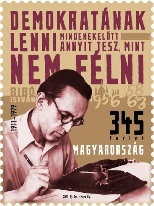
1. MAGYAR - JELES MAGYAROK: 100 ÉVE SZÜLETETT BIBÓ ISTVÁN (1911-1979) - Bélyeg rendelési kód: 2011 év bélyegei kompletten
2. ENGLISH - PROMINENT HUNGARIANS: ISTVAN BIBO WAS BORN 100 YEARS AGO - Order code of the stamp: 2011 Year stamps complete
3. GERMAN - - Die Bestellnummer Der Marke: 2011 Jahr Briefmarken komplett
1. MAGYAR - JELES MAGYAROK: 100 ÉVE SZÜLETETT BIBÓ ISTVÁN (1911-1979)
A Magyar Posta alkalmi bélyeg kibocsátásával köszönti Bibó István születésének 100. évfordulóját.
Bibó István (Bp., 1911. VIII. 7. – 1979. V. 10.) Széchenyi-díjas (posztumusz, 1990) jogász, politikus, a magyar nemzet 1956-os hőse. A szegedi Ferenc József Tudományegyetemen állam-, majd jogtudományi diplomával végzett. 1938-ban bírósági jegyző, majd az Igazságügyi Minisztérium tisztviselője lett. A német megszállás során menleveleket állított ki október 16-i letartóztatásáig. Rövid fogsága után a világháború végéig apósa, Ravasz László püspök bújtatta. 1945-47 között a Belügyminisztérium közigazgatási osztályát vezette, a megyerendszer reformján dolgozott, és a Nemzeti Parasztpárt delegálta a Jogi Reformbizottságba. Meghatározó résztvevője a választójogi törvény és az 1945. november 4-i válasz-tás előkészítésének. A II. világháború után a Válasz rendszeres szerzője. 1946-50 között a Szegedi Tudományegyetem professzora és az MTA tagja. 1951-től az ELTE Könyvtár tudományos főmunkatársa.
1956. október 30-án részt vett a Nemzeti Parasztpárt majd november 1-jétől új nevén a Petőfi Párt újjászervezésében. November 3-án államminiszterré nevezték ki. Másnap megindult a katonai invázió, majd mint az egyedüli törvényes magyar kormány képviselője felhívást intézett egyfelől a magyar néphez, hogy „a megszálló hadsereget vagy az általa esetleg felállított bábkormányt törvényes felsőségnek ne tekintse, s vele szemben a passzív ellenállás összes fegyvereivel éljen”; másfelől kérte a nagyhatalmak és az Egyesült Nemzetek döntését a leigázott magyarság szabadsága érdekében. Miniszteri megbízatása november 12-én a kormány felmentésével szűnt meg. Újabb javaslatot dolgozott ki a „magyar kérdés kompromisszumos megoldására”, amelyet a Nagybudapesti Központi Munkástanács tárgyalási alapnak fogadott el. December elején India budapesti nagykövetével tárgyalt és átadta neki a Nyilatkozat Magyarország állami, társadalmi és gazdasági rendjének alapelveiről és a politikai kibontakozás útjáról című, Farkas Ferenccel, Varga Istvánnal, Féja Gézával és Tamási Áronnal közös írását. 1957 elején írta Magyarország és a világhelyzet című tanulmányát, mely német nyelven jelent meg a bécsi Die Presse lapban. 1958-ban életfogytiglani börtönre ítélték. Az 1963. évi amnesztiával szabadult, majd nyugdíjazásáig a KSH Könyvtárában tevékenykedett. Nyugdíjas éveiben fordított, munkáit rendezte, kisebb műveket publikált. (F.: hu.wikipedia.org)
A születési centenáriumot köszöntő bélyegkép előterében az alkotó Bibó István látható, a háttérben legendássá vált mondata: „Demokratának lenni min-denekelőtt annyit tesz, mint nem félni” olvasható, továbbá életének fontos évszámai (1956, -58 és
-63), valamint az Országház sziluettje fedezhető fel. A bélyeghez tartozó alkalmi borítékon A kelet-európai kisállamok nyomorúsága (1946) c. tanulmányának részlete olvasható. Alatta a munkásságára és a korra utaló szimbolikus grafikai kompozíció található: egy írógép összekuszálódott ütőkarjai utalnak életének viharos éveire, míg a rendezett ütőfejek – nevét, valamint születésének és halálának évszámait összegezve – örök érvényű életművét jelképezik. Az alkalmi bélyegző grafikáján Bibó István portréjának stilizált rajza szerepel.
Forrás: Posta
2. ENGLISH - PROMINENT HUNGARIANS: ISTVAN BIBO WAS BORN 100 YEARS AGO
Magyar Posta is celebrating the 100th anniversary of the birth of István Bibó by issuing a special stamp.
István Bibó (Budapest, 07.07.1911 – 10,05.1979 Széchenyi award-winning (posthumous, 1990) lawyer, politician, 1956 hero of the Hungarian people. He graduated from the Ference József University in Szeged with degrees in political and then legal sciences. In 1938 he was clerk of court and then an official at the Ministry of Justice. During the German occupation he issued safe-conduct documents until his arrest on 16 October. After a short term of imprisonment his father-in-law, bishop László Ravasz hid him until the end of the war. Between 1945-47 he was in charge of the public administration department of the Ministry of Interior working on the reform of the county system, and the National Peasant’s Party delegated him to the Legal Reform Committee. He was a prominent participant in the preparation of the voting right act and of the elections held on 4 November 1945. After the Second World War he was a regular contributor to the periodical Válasz. Between 1946-50 he was a professor at Szeged University and a member of the Hungarian Academy of Sciences. From 1951 he was chief academic staff member of the ELTE University library.
On 30 October 1956 in the re-establishment of the National Peasants Party and from 1 November under its new name of the Petőfi Party. On 3 November he was appointed to the post of state minister. The next day the military invasion started, then as the representative of the only legal Hungarian government he called upon the Hungarian people “to not view the invading army or any puppet government set up by it as the legal authority, and to resist all of their weapons passively”, he also asked the international powers and the United Nations to make a decision in the interest of the freedom of the suppressed Hungarian people. His position as minister was terminated on 12 November with the dissolution of the government. He worked out a new proposal for “a compromise solution to the Hungarian question”, which the Greater Budapest Central Workers’ Council accepted as a basis for negotiation.
At the beginning of December he negotiated with the Indian ambassador in Budapest and handed over a document written by him and Ferenc Farkas, István Varga, Géza Féja and Áron Tamási entitled: Declaration on the state, social and economic system of Hungary and its path of political development. At the beginning of 1957 he wrote a study entitled: Hungary and the world situation, which was published in German in the Vienna newspaper Die Presse. In 1958 he was sentenced to life imprisonment. He was released with the amnesty of 1963, then he worked in the Library of the Central Statistics Office until retirement. During his years in retirement he translated, organised his works and published shorter works. (Source: hu.wikipedia.org)
In the foreground of the stamp celebrating the centenary of his birth you can see István Bibó at work and in the background his legendary sentence: “Before everything else being a democrat means to be not afraid” can be read, there are also important dates from his life (1956, -58 and –63), you can also see a silhouette of the Houses of Parliament. The first day cover belonging to the stamp includes an excerpt from his study: The misery of the small Eastern European states (1946). Under this is a symbolic graphic composition referring to his work and the age: the tangled-up letter arms of a typewriter referring to the stormy years of his life, while the arranged letter arms – summarising his name and the years of his birth and death – symbolise his eternally valid lifework. The graphic design on the special cancellation stamp contains a stylised drawing of a portrait of István Bibó.
3. GERMAN -










